What Do Germans Think of the Juicero?
Deutschland über us (now almost as strong as two human hands).
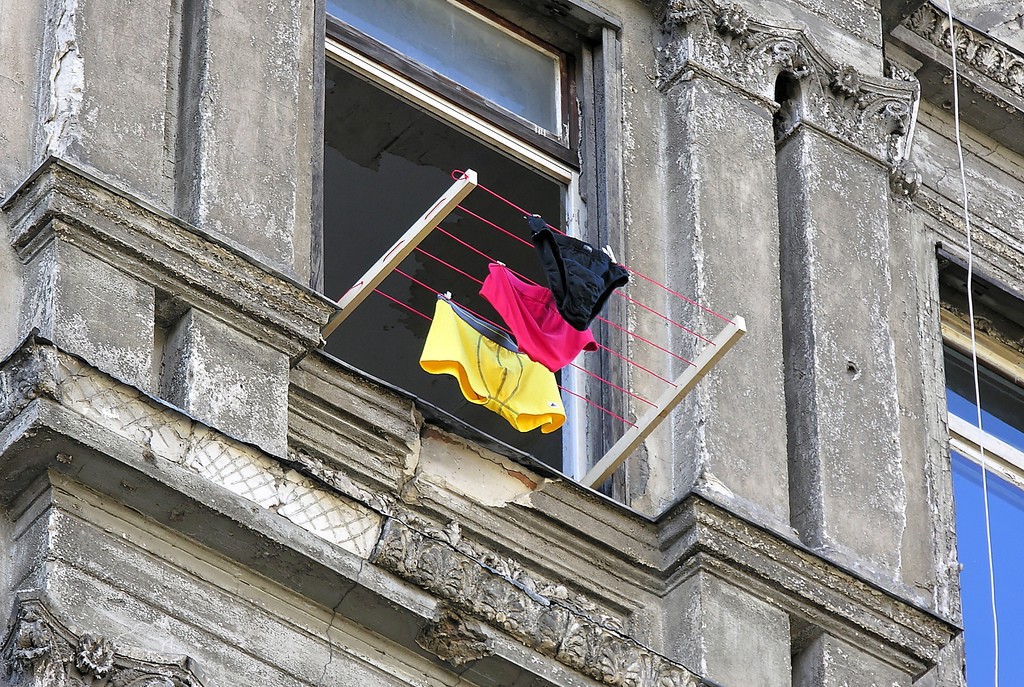
Despite the recently accepted honor of most important country in the world, Germany is a small place. Geographically, it is not even the size of Montana; its population (80 million very stern people) is about twice the size of California. At the same time, German speakers are very obsessed with the news: in parts of Germany and all of Austria, for example, the $7 price of a cup of coffee at a Kaffeehaus is justified because patrons can sit and nurse that coffee for ten hours while they read literally every single page of every single newspaper to which the Kaffeehaus subscribes precisely for that purpose. The result? When they run out of their own news (which they always do), Germans and Austrians keep up with news from all over the world — even when (prepare to spit out your breakfast cupcakes, Amis) that news doesn’t necessarily concern them.
And this means that even in a week when the Head Debutante of the West Wing shows up at a German women’s event and touts her daddy’s agenda (and gets reacted to extremely appropriately), there is still space in the German press for the most pressing issue in the world. (That was a pun, which is a German’s favorite method of humor, which is why Heidegger is so hilarious.) And the reason for the employment of that pun (explaining jokes is a German’s second-favorite method of humor) is that the German press still managed to weigh in on a certain American press…a juice press, that is. (GET IT? TWO USES OF THE WORD “PRESS.”)
What, pray tell, does the Teutonic media have to say about a certain $400 wifi-enabled kitchen gadget, one that squeezes juice out of pre-packaged packages of slightly thicker juice, with a unit of force that only people in Silicon Valley are meant to understand (despite it sharing a name with an actual unit of scientific measurement that measures something entirely unrelated to fruit juice) — a unit that, it turns out, is roughly equivalent to slightly less than the gripping power of two journalist hands? HAS THE JUICERO MADE THE GERMAN NEWS? HAS IT? HAS IT? HAS IT?
The answer is ja! First let’s check out jetzt (“now”), a Cool Young People’s Blog operated by the Süddeutsche Zeitung, aka the New York Times of Germany.
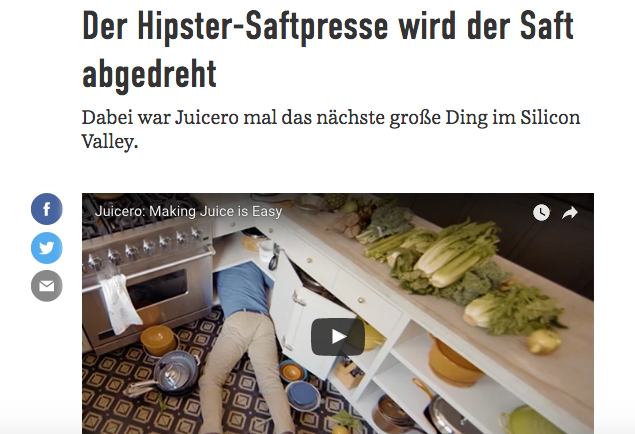
This headline translates, loosely, thus: “The hipster juice press is all out of juice,” with juice having the same double meaning here that it does in English, GET IT? Why they didn’t go with the double meaning of press, which is also the same in their language and given our own media’s evisceration of the contraption, don’t know, but there you have it. Literally what it says is closer to “[With] the hipster juice press, the juice is turned off,” which, if you say it to yourself in a thick German accent, is indeed very funny. The piece itself is, as German humor tends to be when not punning, sandpaper-dry:
Anyone who quickly checks their pocket calculator to see just how much a glass of this juice costs will probably come to the conclusion that even Til Schweiger’s Hamburg tap water (at EUR 4,20 a liter) is almost a bargain. On the other hand: Normal juice presses don’t have WiFi — the end-all be-all argument of the Juicero’s adherents.
The best things about this paragraph, other than its reference to a pocket calculator and sick burns on Tils, the ill-fated bottled water venture of sexy German actor-man Til Schweiger, is lost in translation: the German word for “juicer,” Entsafter (ent-ZOFT-ur) literally means “de-juicer,” which, of course, is much more accurate; and, even better, the German expression I’ve translated to “end-all be-all” is Totschlag-Argument (TOTE-shlog-ar-goo-MENT), the first word of which literally means “death blow,” something I am betting Juicero founder Doug Evans would like to deal to the valiant hand-squeezers at Bloomberg that first broke this story.
Meanwhile, the Osnabrücker Zeitung — the functioning local newspaper out of the small Saxon town of Osnabrück — dispenses with both subtlety and puns, and wonders, simply: “Is the Juicero juice press the most preposterous product of all time?”
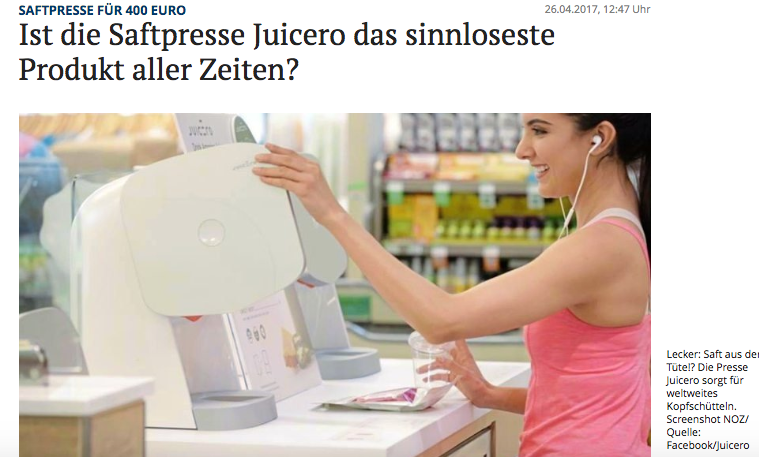
The word I’ve translated as “preposterous” here is sinnlos, the primary meaning of which is “senseless,” which also happens to be the word Ludwig Wittgenstein uses at the end of the Tractatus logico-philosophicus to refer to all the propositions of philosophy, which he deems impossible to express in human language, rendering unto the entire discipline exactly the sort of futility one might grant the quest for fresh-pressed juice at a reasonable price.

The Osnabrücker may join the United States in the Fulbrightian exchange of mutual understanding and mockery of this device, but I think the Juicero could potentially crack the German market. Because Germans love juice.
They love juice so much that any full-grown adult can march to the bar of even the most debauched nightclub and order her grown-adult ass a glass of juice. What the bartender will gladly pour without batting an Auge comes from a tall bottle, the likes of which is available in an astounding variety of supergeilen flavors and colors from one’s local EDEKA, Aldi or Lidl. (The best of these flavors is the “healthy” Multivitaminsaft, or multi-vitamin juice, which is Sunny D for adults.)
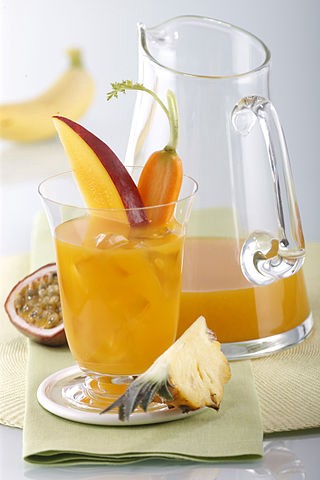
All German juices are highly concentrated, and comparable in sugar content (added or natural) to your average Spider-Man sheet cake — which is to say, they are delicious, but not particularly refreshing, especially if one orders a single glass in an aforementioned establishment, and receives exactly one-fifth of a liter, in a little glass actually marked with a “0,2” and a line, to which the juice is filled to the millimeter. (METRIC SYSTEM.) This offering will provide the refreshment of a dose of DayQuil and cost $6.
So, what many Germans (and all Austrians) do to up both the quench quotient and value of their juices is spritz the everloving fuck out of everything. Traditional spritzing involves carbonated water, either bottled mineral water (which will cost another $7 but last a few more minutes) or seltzer, but one can also order a Kirschsaft auf ein halbes Liter Leitungswasser gespritzt (KERRSH-zoft owf ayn HOLB-us LEE-tur LIE-tungs VOSS-ur guh-SHPRIST), i.e. cherry juice “spritzed” with half a liter of tap water, the drink of choice of my Austrian buddy Michael, which I promptly coopted. During the summer months, all manner of alcohol is also gespritzt, especially in Austria, where the Weisser Spritzer (WHY-sur SHPRIT-sur), or white wine spritzer, is the de facto national drink.
All of this is to say that residents of the German speaking lands already have a cultural relationship to juice. HOWEVER. German speakers are also obsessed with natural health “remedies” of dubious proven worth, such as homeopathy, spa cures and shit-tons of direct sunlight. Fresh pressed juice, with its higher concentration of vitamins and nutrients (but same negligible concentration of fiber and hence sugar-bomb status), seems like the kind of thing Germans would be into. ARE THEY?
Evidence #1: The instagram feed of Frankfurt Fitnessblogger Florian Liebig (a.k.a. “Flooorrriii,” whose pronunciation is your guess as well as mine). Here, Flo shares both the recipe (sounds gross) and the results (“too much ginger”) of a recent glass of juice he made with his 104,000 followers. It has almost 4000 likes, which is unequivocal scientific evidence in favor of Team Saft.
Evidence #2: Berlin currently contains at least two dozen juice bars (one of which is called, amazingly, Funk You), which is still probably only 1/400th of its tanning parlors but surely outnumbers, say, the pay phone booths (RIP).
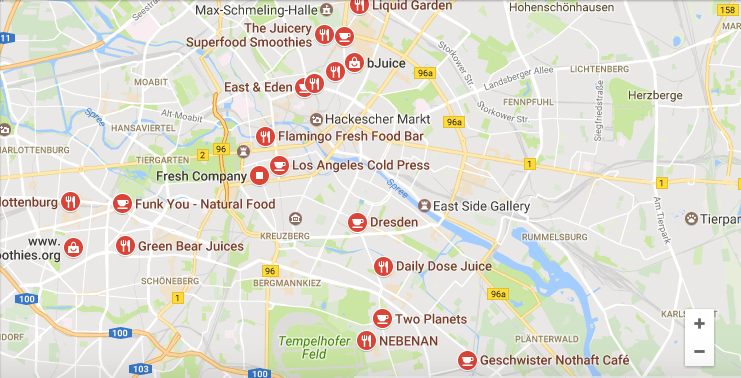
Evidence #3: Germans love expensive gadgets that do one thing, if they do that thing well: Every German kitchen has einen Wasserkocher, aka a “water-boiler,” or electric teakettle, whose water-boiling speed is their Audi to my 2000 Saturn (yes, I do drive a 2000 Saturn). Or Der Mixer, which is what Germans call a blender in their wonderful tradition of slightly-off appropriations of English. (Longdrinks=cocktails; Smoking=tuxedo jacket; Handy=mobile telephone, ha ha ha.) They even have their own somewhat Juicero-esque preferred maker of coffee: the Pads machine, which is sort of like a Keurig if it made delicious crema-style coffee instead of hot gravel swill.
As much, then, as Germans correctly retain a healthy skepticism of all things Silicon Valley (including Peter Thiel’s president and that guy’s lame liar daughter), I’m not a hundred Prozent convinced that their skepticism of this particular American press is warranted. All Doug Evans has to do is add a $700 wifi-enabled spritzing function.
